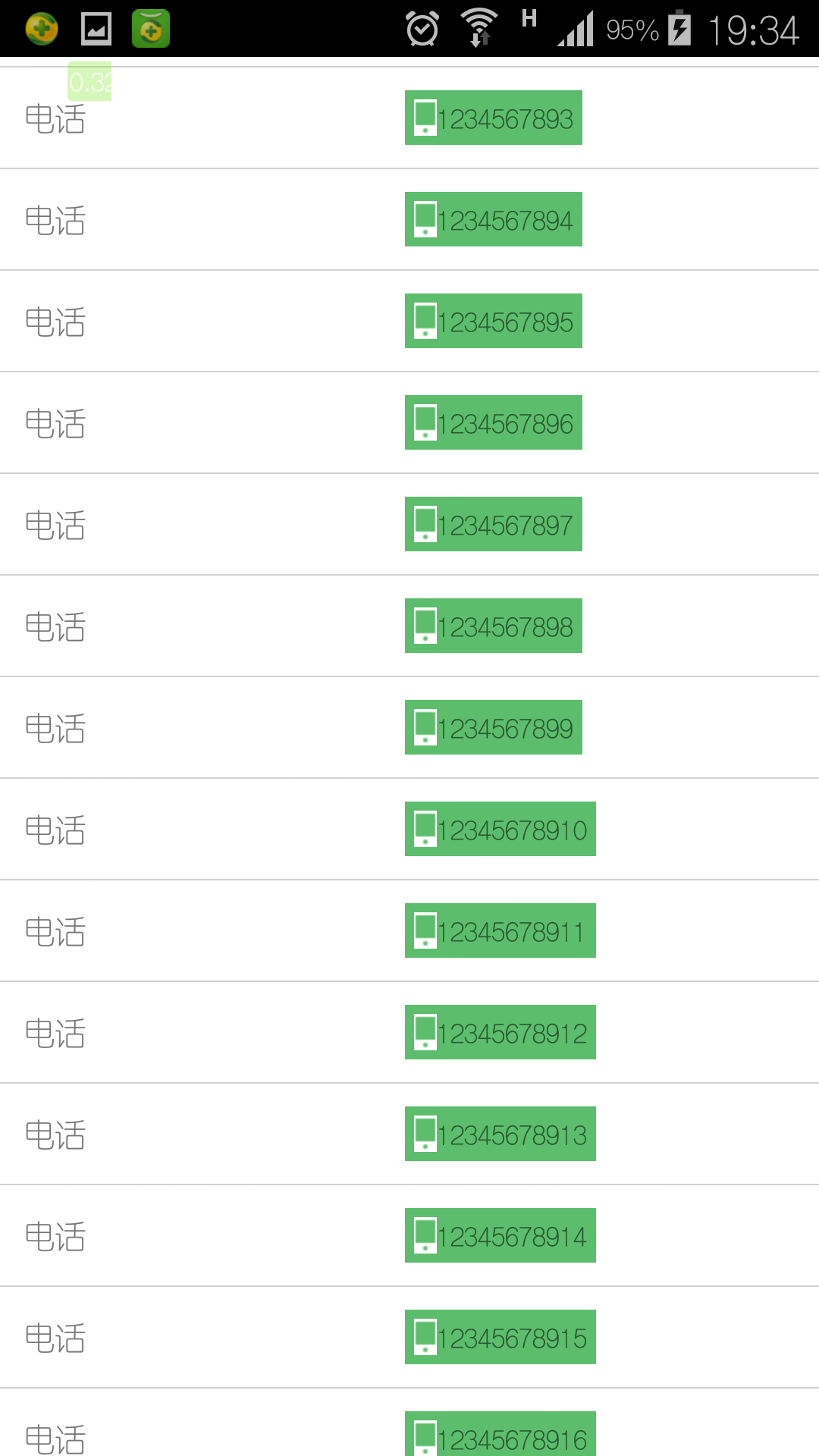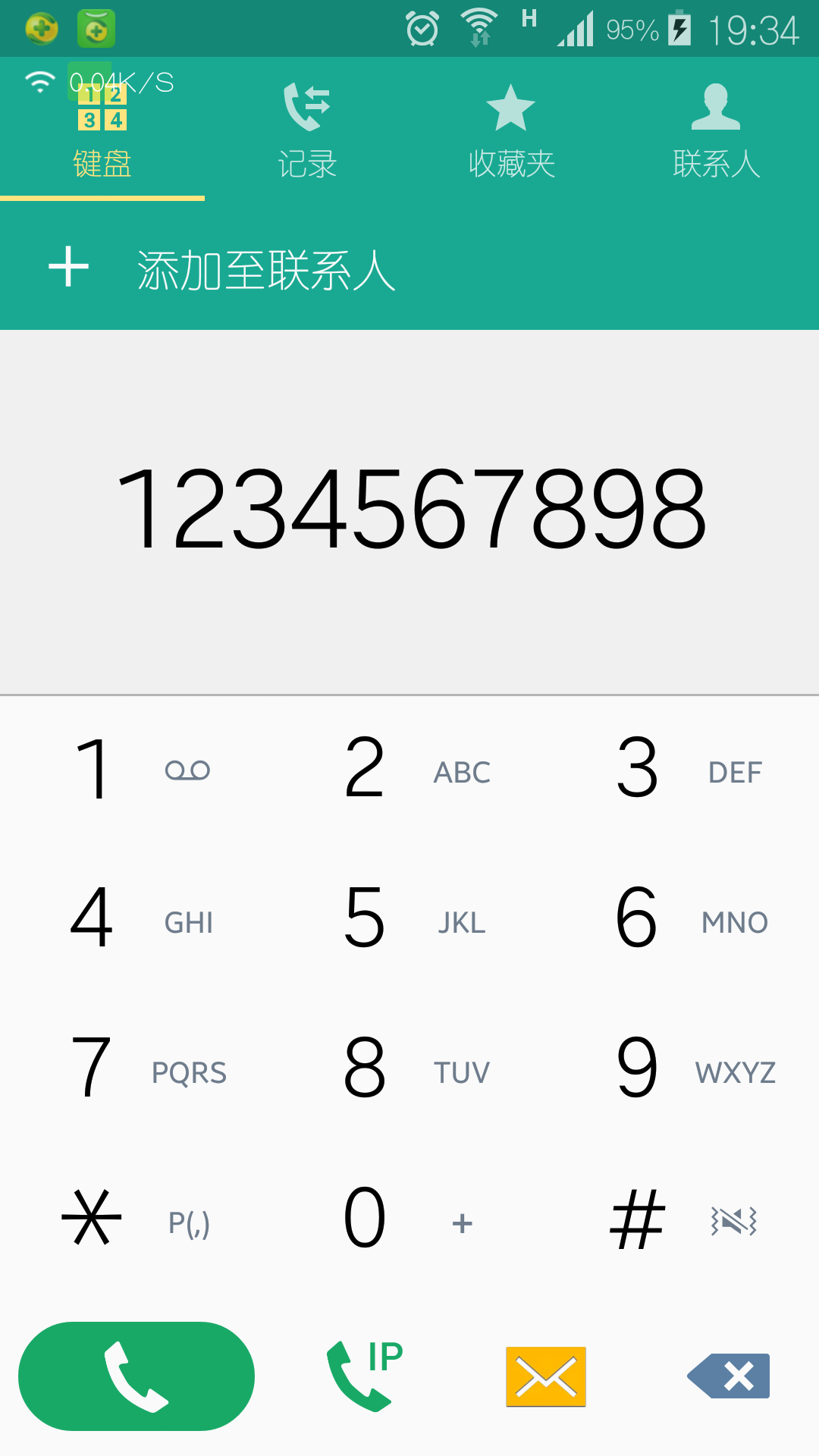最近讨论了一个项目需求,在ListView的Item中放置了一个类似电话的图标,点击图标可以将号码调到拨号界面。实现起来很是容易,原理也易懂,较为实用,项目中有需要的可以直接引入。
我模拟了一个简单的demo.代码如下:
1.ListAdapter.java:
package com.example.listviewphone;import java.util.List;import android.content.Context;import android.content.Intent;import android.net.Uri;import android.view.LayoutInflater;import android.view.View;import android.view.View.OnClickListener;import android.view.ViewGroup;import android.widget.BaseAdapter;import android.widget.TextView;public class ListAdapter extends BaseAdapter { private List<Test> tests; private Context context; LayoutInflater layoutInflater; public ListAdapter(Context context,List<Test> tests){ this.tests=tests; this.context=context; layoutInflater=LayoutInflater.from(context); } @Override public int getCount() { return tests.size(); } @Override public Object getItem(int position) { return tests.get(position); } @Override public long getItemId(int position) { return position; } @Override public View getView(final int position, View convertView, ViewGroup parent) { ViewHolder viewHolder=null; if(convertView==null){ viewHolder=new ViewHolder(); convertView=layoutInflater.inflate(R.layout.item_list, null); viewHolder.mTitleLisTextView=(TextView)convertView.findViewById(R.id.tv_title_list); viewHolder.mPhoneTextView=(TextView)convertView.findViewById(R.id.tv_phone_list); convertView.setTag(viewHolder); }else { viewHolder=(ViewHolder) convertView.getTag(); } viewHolder.mTitleLisTextView.setText(tests.get(position).getTitle_lost()); viewHolder.mPhoneTextView.setText(tests.get(position).getPhone_lost()); viewHolder.mPhoneTextView.setOnClickListener(new OnClickListener() { @Override public void onClick(View v) { // Intent intent = new Intent(Intent.ACTION_CALL,Uri.parse("tel:"+tests.get(position).getPhone_lost())); //直接拨打电话,较为暴利,慎用! Intent intent = new Intent(Intent.ACTION_DIAL,Uri.parse("tel:"+tests.get(position).getPhone_lost())); //跳转到用户界面较为温和,推荐使用! context.startActivity(intent); } }); return convertView; } class ViewHolder { private TextView mPhoneTextView; private TextView mTitleLisTextView; ViewHolder() { } }}2.javabean—Test.java:
package com.example.listviewphone;public class Test { private String content_test; private String phone_test; private String title_test; private String username;public String getContent_test() { return content_test;}public void setContent_test(String content_test) { this.content_test = content_test;}public String getPhone_test() { return phone_test;}public void setPhone_test(String phone_test) { this.phone_test = phone_test;}public String getTitle_test() { return title_test;}public void setTitle_test(String title_test) { this.title_test = title_test;}public String getUsername() { return username;}public void setUsername(String username) { this.username = username;}}3.MainActivity.java:
package com.example.listviewphone;import java.util.ArrayList;import java.util.List;import javax.security.auth.PrivateCredentialPermission;import android.app.Activity;import android.os.Bundle;import android.view.Menu;import android.view.MenuItem;import android.view.Window;import android.widget.ListView;public class MainActivity extends Activity { private ListView mListView; private ListAdapter adapter; private List<Test> tests; @Override protected void onCreate(Bundle savedInstanceState) { super.onCreate(savedInstanceState); requestWindowFeature(Window.FEATURE_NO_TITLE); setContentView(R.layout.activity_main); mListView=(ListView)findViewById(R.id.listview); initDatas(); adapter=new ListAdapter(this, tests); mListView.setAdapter(adapter); } private void initDatas() { tests=new ArrayList<Test>(); for (int i = 0; i < 30; i++) { Test test =new Test(); test.setTitle_test("电话"); test.setPhone_test("123456789"+i); tests.add(test); } }}下面是简单的两个布局文件:
1.activity_main.xml:
<RelativeLayout xmlns:android="http://schemas.android.com/apk/res/android" xmlns:tools="http://schemas.android.com/tools" android:layout_width="match_parent" android:layout_height="match_parent" > <ListView android:id="@+id/listview" android:layout_width="match_parent" android:layout_height="wrap_content" /></RelativeLayout>2.item_list.xml:
<?xml version="1.0" encoding="utf-8"?><LinearLayout xmlns:android="http://schemas.android.com/apk/res/android" android:layout_width="match_parent" android:layout_height="wrap_content" android:padding="10dp" android:background="#ffffff" android:orientation="horizontal" > <TextView android:id="@+id/tv_title_list" android:layout_width="wrap_content" android:layout_height="wrap_content" android:text="电话" android:singleLine="true" > </TextView> <TextView android:id="@+id/tv_phone_list" android:textSize="12sp" android:layout_height="wrap_content" android:layout_width="wrap_content" android:background="@color/green" android:text="138024249542" android:padding="4dp" android:layout_marginLeft="140dp" android:drawableLeft="@drawable/icon_photo" > </TextView></LinearLayout>运行实例如下: 


总结:有两种跳转,1-Intent.ACTION_CALL 直接拨打电话,较为暴利慎用;
2-Intent.ACTION_DIAL 跳到拨打界面,推荐使用
有需要的引入自己的项目吧,喜欢的朋友关注个吧! 多谢支持!
版权声明:本文为博主原创文章,未经博主允许不得转载。
- 1楼qq_30649905昨天 21:51
- 11111111111111111111111111111111111